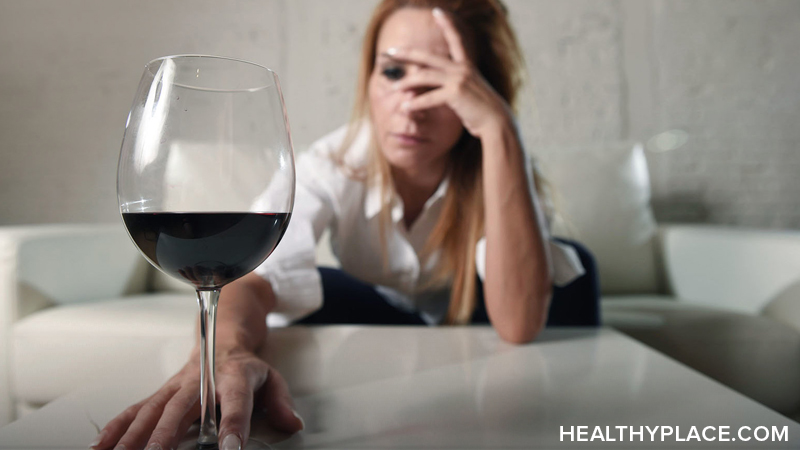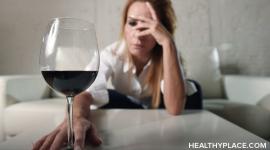What’s the Relationship Between Depression and Alcohol?

There is a strong relationship between depression and alcohol. The two can contribute to each other in a dance that quickly becomes a vicious circle. When someone is struggling with depression, the idea of turning to alcohol for some relief, known as self-medicating, can be tempting. Conversely, drinking alcohol can lead to depression symptoms in someone who hadn’t previously experienced them, or it can worsen depression symptoms in someone already living with depression. The nature of the relationship between alcohol and depression does indeed run deep. It’s also intricate. Let’s look at what is known about the nature of their connection.
One caveat to keep in mind as we examine the intertwined relationship between depression and alcohol is that researchers haven’t determined the degree to which one directly causes the other. Substance use and depression are each too complex and multifaceted to assert a causal relationship between them. It is known, however, that each one is a contributing factor to the other, working with other elements to be part of the cause. They also cause increased problems for the person who lives with depression and uses alcohol.
The Relationship Between Depression and Alcohol: Facts and Statistics
Depression rates are high among people who abuse alcohol. Between 30 and 40 percent of alcoholics experience a depressive disorder while they are struggling with drinking (Shivani et al., 2002).
Citing numerous studies, Fabian (2018) notes that:
- Living with either alcohol abuse or depression doubles the chance of developing the other
- Alcoholism can cause a depression relapse
- Depression and alcohol worsen each other’s symptoms and effects
- Alcohol use and depression make each other’s treatment more difficult
Both men and women can become stuck in the cycle of depression and drinking, but they tend to jump into that cycle differently. Women often develop depression first and then begin to use alcohol. Men, on the other hand, often begin to develop alcohol dependency first and then develop depression.
Clearly, the connection between alcohol and depression is very real. What is the nature of the relationship?
An Unhealthy Relationship Between Depression and Alcohol: Alcohol Worsens Depression Symptoms
Using alcohol exacerbates symptoms of depression, especially during times of intoxication and during withdrawal. Among the depression symptoms that are especially aggravated by alcohol:
- Sleep problems, whether insomnia or sleeping too much
- Fatigue, lack of energy, and difficulty functioning
- Lethargy and decreased motivation
- Restlessness
- Irritability
- Appetite changes and related weight loss or gain
- Feelings of worthlessness and guilt
- Hopelessness and helplessness
- Pessimistic, negative thoughts
Many times, people self-medicate with alcohol in an attempt to escape these disruptive symptoms. Unfortunately, when they do, their symptoms just intensify.
Alcohol, Depression, and the Brain
The brain seems to be the reason for the relationship between these two illnesses. Depression is largely brain-based. Alcohol affects the brain in ways that negatively impact someone’s life, overall health, and mental health. Regarding depression, alcohol:
- Dampens mood and affects thoughts
- Depresses neurotransmitters implicated in depression, like mood-regulating serotonin and norepinephrine
- Slows down functioning throughout the brain and nervous systems
- Decreases levels of folic acid; folate deficiency has been tied to depressive disorders
- Can activate a gene that has been tied to depression
- Often sets anxiety mechanisms in the brain in motion; anxiety and depression frequently co-occur
Alcohol leads to more problems when someone is taking medication for depression. Alcohol doesn’t mix well with antidepressants and other medications used for depression. It can cause dangerous reactions and decrease the effectiveness of these medications. Antidepressants, in turn, can intensify the negative effects of alcohol.
Alcohol also can worsen existing health conditions, both mental and physical. This makes depression much harder to treat.
Whether it is intensifying depression, making treatment harder, or both, alcohol does affect depression. Depression can lead to alcohol use and even abuse. The pattern can be detrimental to health and quality of life. This, happily, can be temporary. Once alcohol is stopped, depression symptoms begin to respond well to treatment. With professional help and support, the relationship between depression and alcohol can become nonexistent.
APA Reference
Peterson, T.
(2021, December 30). What’s the Relationship Between Depression and Alcohol? , HealthyPlace. Retrieved
on 2025, November 27 from https://www.healthyplace.com/depression/effects/whats-the-relationship-between-depression-and-alcohol



